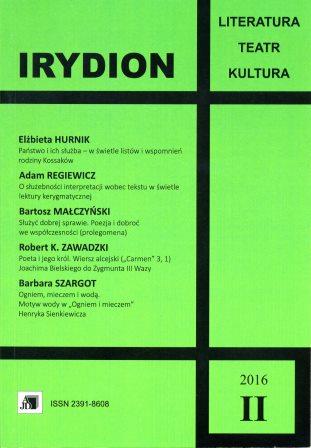Państwo i ich służba – w świetle listów i wspomnień rodziny Kossaków
Masters and their servants – in the light of the letters and memoirs of the Kossak family
Author(s): Elżbieta HurnikSubject(s): Language and Literature Studies, Studies of Literature
Published by: Uniwersytet Jana Długosza w Częstochowie
Keywords: letter, landowners; traditions; domestic servant; Cracow
Summary/Abstract: The paper aims at the reconstruction of the relationships between the employers and employees that prevailed in the Kossak family domiciled in Cracow in the second half of the 19th century. The voluminous collection of Wojciech Kossak’s letters to his wife and friends, dated between 1883-1942, constitutes the sources published by Kazimierz Olszański in 1985, along with the memoirs of some family members and literary works by Kossak’s daughters.The Kossaks (in three generations) were the painters creating the battle and genre scenes. The family originated from the gentry, where the landowners’ traditions were combined with the artistic lifestyle. Wojciech, a successful representative of the second generation, travelled extensively throughout most of his life searching for new customers. The maintenance of “Kossakówka”, the Cracow manor house, its housekeeping, bringing up children, required the assistance of a few employees, a cook, maid, gardener, and governors. Wojciech Kossak’s daughters, Maria Pawlikowska-Jasnorzewska, a poet and Magdalena Samozwaniec, a satirical author and writer, received home education; his son, Jerzy, a future painter and continuator of family traditions, attended the school. Wojciech’s letters and the recollections of the family members and the house friends reflect the relationships between the house dwellers and the domestic servants, house tutors, chauffeurs of the painter. Some domestic servants had worked in the Kossaks’ house for years, their characters had been preserved in literature – the poetic war prose by Maria Pawlikowska-Jasnorzewska, the memoir novels by Magdalena Samozwaniec. The sources explored in this paper reflect the lifestyle of the class that still belonged to the class of the landowners, that observed many of the old traditions; however, they already managed to combine them with the modern life trends. The relationships with the domestic staff solidify this vision.
Journal: Irydion. Literatura – Teatr – Kultura
- Issue Year: II/2016
- Issue No: 1
- Page Range: 51-66
- Page Count: 16
- Language: Polish

